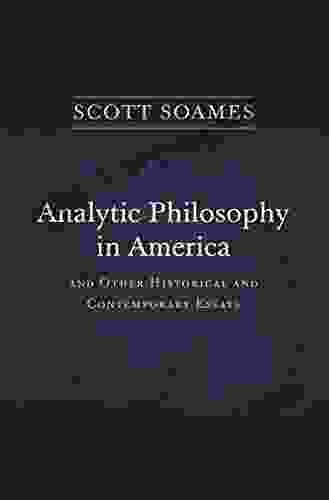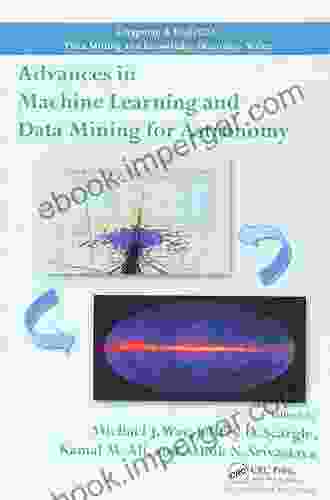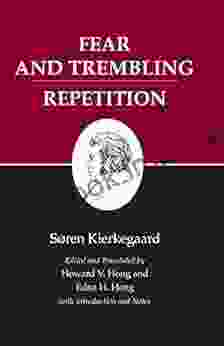Analytic Philosophy in America: A Historical Overview

Analytic philosophy is a school of philosophy that emphasizes the use of logic and precise language to analyze philosophical problems. It arose in the early 20th century as a reaction to the perceived vagueness and obscurity of traditional philosophy. Analytic philosophers believe that philosophical problems can be solved by clarifying the meaning of words and concepts, and by using logical reasoning to draw inferences from those meanings.
Analytic philosophy has been a major force in American philosophy since the 1920s. Many of the most important analytic philosophers of the 20th century, such as W.V.O. Quine, Willard Van Orman Quine, and Donald Davidson, have worked in the United States. Analytic philosophy has also been influential in other fields, such as linguistics, cognitive science, and computer science.
5 out of 5
| Language | : | English |
| File size | : | 3637 KB |
| Text-to-Speech | : | Enabled |
| Screen Reader | : | Supported |
| Enhanced typesetting | : | Enabled |
| Word Wise | : | Enabled |
| Print length | : | 370 pages |
The Early Years of Analytic Philosophy in America
The early years of analytic philosophy in America were dominated by the work of Charles Sanders Peirce and William James. Peirce was a logician and mathematician who developed a new approach to logic that emphasized the importance of symbols and their interpretation. James was a psychologist and philosopher who developed a theory of pragmatism, which holds that the truth of a statement is determined by its practical consequences.
Peirce and James had a significant influence on the development of analytic philosophy in America. Peirce's work on logic provided a foundation for the development of analytic philosophy as a distinct school of thought. James's work on pragmatism provided an alternative to the traditional rationalist approach to philosophy.
The Logical Positivists
In the 1920s, a group of philosophers known as the logical positivists emerged in Vienna. The logical positivists believed that all meaningful statements are either analytic or synthetic. Analytic statements are true by virtue of their meaning, while synthetic statements are true or false based on empirical evidence.
The logical positivists had a major influence on the development of analytic philosophy in America. They introduced a new approach to philosophy that emphasized the importance of logical analysis and empirical evidence. They also developed a number of new philosophical theories, such as the theory of verification and the theory of logical atomism.
The Analytic Tradition in American Philosophy
After World War II, analytic philosophy became the dominant school of thought in American philosophy. This was due in part to the work of W.V.O. Quine and Willard Van Orman Quine, Donald Davidson. Quine was a logician and philosopher who developed a new theory of meaning that challenged the traditional distinction between analytic and synthetic statements. Davidson was a philosopher who developed a new theory of action that emphasized the importance of intentionality.
Quine and Davidson had a major influence on the development of analytic philosophy in America. Quine's work on meaning challenged the traditional foundations of analytic philosophy. Davidson's work on action provided a new way of understanding human behavior.
Analytic Philosophy Today
Analytic philosophy is still a major force in American philosophy today. However, it is no longer the only school of thought. There are now a number of other schools of thought, such as continental philosophy and pragmatism, that are also influential in American philosophy.
Analytic philosophy is a diverse and dynamic school of thought. It is constantly evolving and changing. However, it remains committed to the use of logic and precise language to analyze philosophical problems.
Analytic philosophy has been a major force in American philosophy for over a century. It has produced a number of important philosophical theories and has had a significant influence on other fields, such as linguistics, cognitive science, and computer science. Analytic philosophy is still a major force in American philosophy today, and it is likely to continue to be influential for many years to come.
5 out of 5
| Language | : | English |
| File size | : | 3637 KB |
| Text-to-Speech | : | Enabled |
| Screen Reader | : | Supported |
| Enhanced typesetting | : | Enabled |
| Word Wise | : | Enabled |
| Print length | : | 370 pages |
Do you want to contribute by writing guest posts on this blog?
Please contact us and send us a resume of previous articles that you have written.
 Book
Book Novel
Novel Page
Page Chapter
Chapter Text
Text Story
Story Genre
Genre Reader
Reader Library
Library Paperback
Paperback E-book
E-book Magazine
Magazine Newspaper
Newspaper Paragraph
Paragraph Sentence
Sentence Bookmark
Bookmark Shelf
Shelf Glossary
Glossary Bibliography
Bibliography Foreword
Foreword Preface
Preface Synopsis
Synopsis Annotation
Annotation Footnote
Footnote Manuscript
Manuscript Scroll
Scroll Codex
Codex Tome
Tome Bestseller
Bestseller Classics
Classics Library card
Library card Narrative
Narrative Biography
Biography Autobiography
Autobiography Memoir
Memoir Reference
Reference Encyclopedia
Encyclopedia Kim Cooper
Kim Cooper Kim Collins
Kim Collins Ken West
Ken West Kenneth Koh
Kenneth Koh Kenneth D Ackerman
Kenneth D Ackerman Kiff Bamford
Kiff Bamford Ken Worpole
Ken Worpole Kendra Langeteig
Kendra Langeteig Kevin Edwards
Kevin Edwards Kenneth Atchity
Kenneth Atchity Kevin D Randle
Kevin D Randle Kenneth C Springirth
Kenneth C Springirth Kiera Van Gelder
Kiera Van Gelder Kim Brackett
Kim Brackett Ken Wells
Ken Wells Kenneth J Doka
Kenneth J Doka Kevin Bailey
Kevin Bailey Ken Taylor
Ken Taylor Kevin Quinn
Kevin Quinn Kevin F Mcmurray
Kevin F Mcmurray
Light bulbAdvertise smarter! Our strategic ad space ensures maximum exposure. Reserve your spot today!
 Denzel HayesDiscover the Culinary Lexicon: The Ultimate Guide to Part Names of Dishes on...
Denzel HayesDiscover the Culinary Lexicon: The Ultimate Guide to Part Names of Dishes on... Brent FosterFollow ·19.7k
Brent FosterFollow ·19.7k Roberto BolañoFollow ·3.8k
Roberto BolañoFollow ·3.8k Julio CortázarFollow ·15.3k
Julio CortázarFollow ·15.3k Paul ReedFollow ·6.6k
Paul ReedFollow ·6.6k Dennis HayesFollow ·18.3k
Dennis HayesFollow ·18.3k Dan HendersonFollow ·2.3k
Dan HendersonFollow ·2.3k Morris CarterFollow ·12.2k
Morris CarterFollow ·12.2k Curtis StewartFollow ·10.8k
Curtis StewartFollow ·10.8k

 Chadwick Powell
Chadwick PowellDiscover the Secrets of Optimal Health with "The Healthy...
Preface: Embark on a Transformative...
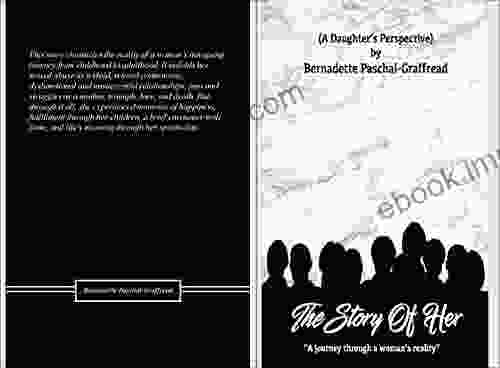
 Andres Carter
Andres CarterUnveiling the Profound Journey of Womanhood: A Daughter's...
In the tapestry of...
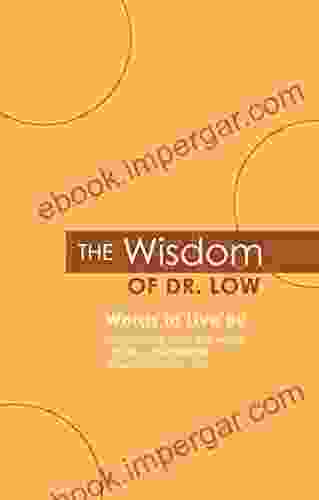
 Travis Foster
Travis FosterWords to Live By: The Essential Guide to Finding...
Words have the power to shape our...

 Chinua Achebe
Chinua AchebeThe Ultimate Guide for Men to Recover from a Breakup
: Breakups are never...

 Spencer Powell
Spencer PowellNew Mindset, New Results: The Proven Path to Unleashing...
About the Book ...
5 out of 5
| Language | : | English |
| File size | : | 3637 KB |
| Text-to-Speech | : | Enabled |
| Screen Reader | : | Supported |
| Enhanced typesetting | : | Enabled |
| Word Wise | : | Enabled |
| Print length | : | 370 pages |


